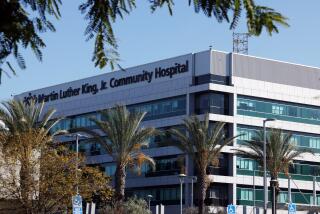Hospital Unit Shakes Off Rare Infection : Health care: King/Drew’s surgical ICU reopens after a monthlong shutdown. Ten patients were afflicted but cause is still unknown.
- Share via
Martin Luther King Jr./Drew Medical Center’s surgical intensive care unit has reopened after a monthlong shutdown in which 10 chronically ill patients were infected by a rare and highly resistant bacterial infection.
The outbreak triggered an investigation by infection-control experts and forced postponement of numerous elective surgeries and isolation of infected patients in a neighboring wing of the 430-bed county facility, according to King’s medical director.
Hospital officials discovered the first strains of Acinetobacter anitratus during a routine laboratory culture study on Jan. 5. During the next five weeks, a number of other tests revealed a cluster of other intensive care unit patients infected with the opportunistic bacterial organism, although no additional cases have been found since Feb. 11.
The patients have been treated and are no longer infected, though some remain in isolation, hospital officials said.
But numerous laboratory tests have failed so far to uncover the source of the infection, which preys primarily on ill patients with weakened immune systems and thrives on damaged skin. Infectious-disease experts believe that the organism, which exists primarily in the throat, the groin, and on hands, probably was transferred through human contact. The infection has been known to cause pneumonia, but most patients carry it without showing any symptoms, according to infection-control investigators.
King hospital officials have downplayed the significance of the outbreak, saying the patients suffered no further health problems as a result of the infection. But the incident has rekindled questions about the standards at the medical center, which last year was cited by state and federal health investigators for a high incidence of hospital-borne infections and fundamental inadequacies in the hospital’s infection-control program.
“Nobody likes to hear that there has been an outbreak; it’s like a nightmare for infection control,” said Dr. Jessie L. Sherrod, director of infection control at King. “But people are human and they occasionally get lax (with sterilization procedures), although it remains to be seen if that was what caused it to spread here.”
The outbreak has so baffled infectious-disease experts that Sherrod said the hospital plans to do a detailed study of the case and publish it in a medical journal. A . anitratus has intrigued infectious-disease detectives like Sherrod because of its resistance to all but a few antibiotics.
“This is not terribly surprising,” Dr. Shirley Fannin, associate deputy director of the disease control program for the Department of Health Services, said of the outbreak at King. “If you put in another hospital’s name and another type of bacteria, it wouldn’t alarm anybody. All hospitals have outbreaks at one time or another.”
Four cases of the bacterial infection were discovered during the first week of January, but hospital officials said they wanted to check the extent of the outbreak and waited until five additional cases were found in the first week of February before they closed the unit.
The last infected patient was confirmed on Feb. 11, after the ICU was closed to all patient admissions and discharges.
The unit reopened March 14.
Dr. James G. Haughton, King’s medical director, said that after the outbreak was reported to county health officials in early February, the patients were immediately transferred to another surgical ward, which had been closed last year because the hospital could not hire enough nurses to staff it.
Patients requiring intensive care after emergency surgery were placed in the hospital’s post-anesthesia recovery area, Haughton said. Those patients, who required long-term hospital care, will remain in isolation until hospital officials are convinced the infection has not spread elsewhere.
“We’re hoping to find the one thing that triggered the outbreak,” Sherrod said. “When you deal with something like this, where an organism turns up, doesn’t go away (in a short time) and it’s a type that is especially difficult to treat, that’s when you get really scared.”
BACKGROUND Martin Luther King Jr./Drew Medical Center was placed on conditional accreditation last month after a team of medical investigators from the Joint Commission on Accreditation of Healthcare Organizations found widespread problems in staffing, record-keeping, quality assurance programs and patient care. In addition, a turnaround by the hospital staff to bring it into compliance with most national health-care standards last year was enough to persuade federal health officials not to withhold $60 million in Medicare and Medicaid funds that had been threatened.






